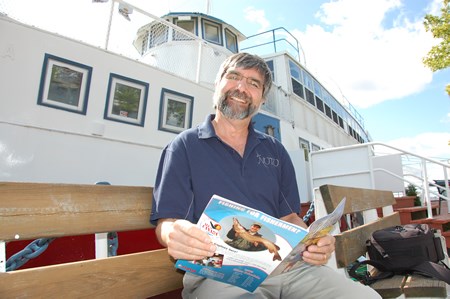Doug Reynolds likes to think of the Northern Ontario Tourist Outfitters Association (NOTO) as a voice of calm and reason in the midst of mass confusion.
When phone calls stream into their North Bay office with questions on how the new fishing regulations will impact a lodge business, or if a minor criminal charge in the U.S. will hamper an American's entry into Canada, NOTO likes to think they'll always have an informed answer.
"There is nobody in government they can call and ask those questions," says Reynolds. "Those people don't exist."
Often, education of public policy falls to industry associations to act as a source of consumer information.
Throughout its 80-year history, public access to Crown land has been frequently written in the pages of NOTO's history since the late 1920's.
When ATV'ers, hunters, anglers, remote camp owners and the forestry industry have been at each other's throats, and at the Ministry of Natural Resources,' over some stretch of disputed logging road, Reynolds has often been in the mix, searching for a solution.
To Reynolds, it's only through thoughtful discussion and mechanisms like resource stewardship agreement, that everyone can win.
Since 87 per cent of Ontario is Crown land, many people think there's unrestricted use, which Reynolds calls "patently untrue." That's always been the crux of public conflict, he says, those who believe in no rules, those who respect multiple users, and some who want the land untouched.
NOTO hasn't always had a conciliatory tone through its history. There were times when the relations with Queen's Park were very frosty. There's also been times when NOTO has been accused of being in bed with the politicians.
Despite what people may think, Reynolds says the business of government relations is more open now than it's ever been over the last 20 years.
"We don't do public policy by lobbying politicians exclusively anymore. Governments now have a well-articulated public policy executed by a professional civil service."
That doesn't stop Reynolds from pounding on a cabinet minister's door. In fact, he knows his way around the corridors of power in Queen's Park better than he knows the street network in North Bay.
Before Reynolds came aboard as NOTO's executive director six years ago, he understood how to interact with government. He worked in advertising and public relations at his Sudbury consulting firm, while volunteering on provincial non-profit boards.
He redefined NOTO as an industry group in helping fine-tune government policy, on issues like drinking water regulations, by seeking allies and forming loose coalitions.
Reynolds arrived in the dying days of the much-despised Northern Tourism Marketing Corporation, soon replaced by a northern office of the Ontario Tourism Marketing Partnership Corporation.
To Reynolds, what's problematic is government equates marketing dollars as a fix-all to supporting the North's cyclical tourism industry. "What needs to be supported is developing an industry that can respond to a changing clientele and marketplace. That means education, product development and investment support."
It doesn't address the day-to-day public and business concerns and issues that frequently filter into his office.
NOTO likes to position itself as a bridge, almost an extended communications arm of government. Some may view them as a lobby group, but Reynolds prefers an advocacy organization that speaks out on policy but also communicates it effectively back to industry.
NOTO is member-supported by some 2,000 small businesses, mostly employing four people or less. In a good year, about 30 per cent are fully paid-up members. "It's voluntary and it's relatively expensive, and in tough times, who's going to pay for it?
"But they know whether they've paid their membership or not, they can call the office, and they're going to get help. And we've got to do it."
Though high gas prices and a sliding American economy have hit NOTO's membership pretty hard this past summer, the industry is in transition.
Outdoor tourism has gone beyond the traditional hook-and-bullet lodge to more 'non-consumptive' pursuits of kayaking, wildlife photography and rock climbing.
The traditional fly-in outpost camps have canoes on site and upscale amenities for clients to relax, rather than hammer the local fishery.
If the North's tourism industry is to stay healthy, wilderness must be a selling point. "We'll grow by value, not volume," says Reynolds.
The operators that offer a high level of service with upscale lodgings, and charge accordingly, have best weathered the economic downturns.
"One American-plan, fly-in lodge owner said to me, if you were to describe how I visualize my business from a guest's standpoint, it should be like going on a cruise," says Reynolds.
That means one staff member for every three guests, a very hands-on level of service, with a picnic basket outside the cabin door for guests getting up at dawn to go fishing.
The camp cook is wearing a chef's jacket and the crusty fishing guide becomes a nature and cultural interpreter.
"Increasingly we're seeing that," says Reynolds, who adds there are few industries that actually create more skilled jobs when they modernize.
One flashpoint issue still out there is the Ontario government's cancellation of the spring bear hunt in 1999. Reynolds supports its reinstatement provided it's based on pure science, not politics. The nuisance bear problem is symptomatic of bad management, he says, though he doesn't advocate a hunt as a solution to keep roaming bears out of people's backyards.
"Last time I looked we were in the tourism business, not the extermination business."
Adverse encounters between bears and humans is the sign of a stressed animal population and he's troubled that nuisance bears are killed, an act he calls a "horrible, offensive, disrespectful" use of a valued social and economic resource.
"A properly conducted spring bear hunt must begin with a clean slate and properly conducted science."




